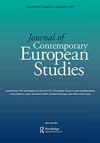引言:弹性国家vs .弹性社会?在地缘政治危机时期,欧盟通过东方伙伴关系保护谁的安全?
IF 1.8
3区 社会学
Q1 AREA STUDIES
引用次数: 0
摘要
本文章由计算机程序翻译,如有差异,请以英文原文为准。
Introduction: resilient states versus resilient societies? Whose security does the EU protect through the Eastern Partnership in times of geopolitical crises?
ABSTRACT The European Union (EU) is making strong inroads into areas of security traditionally reserved to states. Security concerns are increasingly triggered by fundamental challenges, such as terrorism, climate change, migration, and many other ‘soft security issues’. Resilience has become a term of reference in the EU’s official foreign policy discourse, triggering an associated ‘resilience. Our contribution aims to analyse the ‘many faces of resilience’ in the EU’s Eastern Partnership (EaP) in relation to how the EU understands and seeks to enhance European security, mapping the different meanings the terms assume in the EU’s discourses and policy practices, and how they are related to one another. The Russian invasion of Ukraine in February 2022 has largely been viewed as an extraordinary resilience test for the EU and has brought back fundamental concerns on European security, including ‘hard’ military security issues. This has in turn raised questions not only on how the EU can ensure the resilience of its eastern partners and of itself, but also on the EU’s role in a rapidly changing global context of polarisation and fragmentation. In light of these challenges, the contributions to this special issue have only increased in relevance, pointing to pathways and opportunities for how the EU may reconcile the contradictory demands of fostering security and resilience for states and societies alike.
求助全文
通过发布文献求助,成功后即可免费获取论文全文。
去求助
来源期刊

Journal of Contemporary European Studies
Multiple-
CiteScore
2.70
自引率
7.70%
发文量
84
期刊介绍:
The Journal of Contemporary European Studies (previously Journal of European Area Studies) seeks to provide a forum for interdisciplinary debate about the theory and practice of area studies as well as for empirical studies of European societies, politics and cultures. The central area focus of the journal is European in its broadest geographical definition. However, the examination of European "areas" and themes are enhanced as a matter of editorial policy by non-European perspectives. The Journal intends to attract the interest of both cross-national and single-country specialists in European studies and to counteract the worst features of Eurocentrism with coverage of non-European views on European themes.
 求助内容:
求助内容: 应助结果提醒方式:
应助结果提醒方式:


